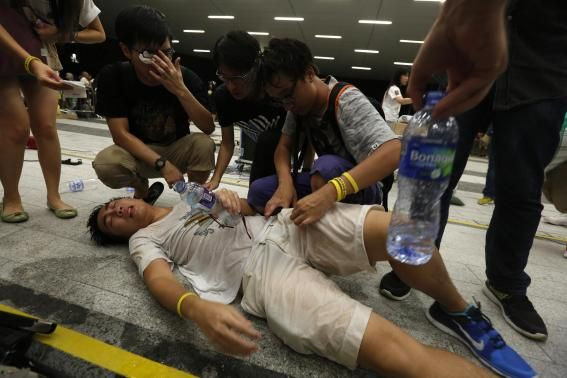Hong Kong Police Used Pepper Spray On Students Who Stormed Government Headquarters

(Reuters) - Riot police used pepper spray early on Saturday to disperse dozens of students who had stormed Hong Kong's government headquarters, but an equal number held their ground in ongoing protests against Beijing's tightening grip on the city.
Hundreds of students had forced their way past a police cordon and scaled perimeter fences at government headquarters, close to Hong Kong's financial district, late on Friday in the culmination of a week-long rally to demand free elections in the former British colony.
Riot police clashed several times throughout the night with protesters who had forced their way through a gate and scaled high fences into a courtyard in front of government offices. Some students had dispersed before police resorted to pepper spray on those remaining.
The scenes were the most heated so far in a series of demonstrations to oppose Beijing's decision in late August to rule out fully democratic elections for the city's leader in 2017.
Police made several arrests, including that of teenage student leader Joshua Wong, who was dragged away by police, kicking, screaming and bleeding from his arm.
Officers continued to douse protesters with pepper spray early on Saturday, with some injured students led out crying as police warned those who remained to leave immediately or face arrest.
"Hong Kong's future belongs to you, you and you," Wong, a thin 17-year-old with dark-rimmed glasses and bowl-cut hair, told cheering supporters hours before he was taken away.
"I want to tell C.Y. Leung and Xi Jinping that the mission of fighting for universal suffrage does not rest upon the young people, it is everyone's responsibility," he shouted, referring to Hong Kong's and China's leaders.
"I don't want the fight for democracy to be passed down to the next generation. This is our responsibility."
Hong Kong returned from British to Chinese rule in 1997 under a formula known as "one country, two systems", with a high degree of autonomy and freedoms not enjoyed in mainland China. Universal suffrage was set as an eventual goal.
But Beijing last month rejected demands for people to freely choose the city's next leader in 2017, prompting threats from pro-democracy activists to shut down the Central financial district in a so-called Occupy Central campaign. China wants to limit elections to a handful of candidates loyal to Beijing.
Held back by hundreds of officers, crowds of onlookers shouted at shield- and helmet-bearing riot police as they clashed early on Saturday with a core group of student leaders and several dozen supporters holding vigil in the Civic Square courtyard.
"Retreat. Retreat. Retreat" the crowds chanted as police advanced and tried to stop them charging forward.
The government said in a statement it found it regrettable that demonstrators tried to forcibly enter the compound, causing injuries to government officers, security staff and demonstrators.
The protest came after more than 1,000 school pupils rallied to support university students demanding full democracy for Hong Kong, capping a week-long campaign that has seen classroom strikes and a large cut-out depicting the city's leader as the devil paraded in public.
© Copyright IBTimes 2024. All rights reserved.





















